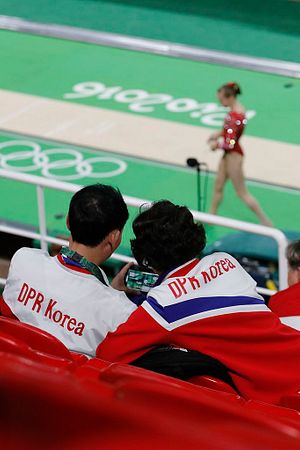Powered by blood, sweat, and tears, any athlete battling for glory at the Olympic Games could easily feel like the stakes couldn’t be higher. For the 31 North Koreans currently competing for their repressive homeland in Rio De Janeiro, that’s probably not far from reality.
For years, North Korea has been reported to extravagantly reward athletes who return from international competitions in glory and harshly punish those who fail. Ahead of the 2012 Olympics in London, North Korean defector Lee Chang-soo told Reuters that he had been banished to a coal mine for back-breaking labor after losing to his South Korean judo rival at the 1990 Asian Games in Beijing
Soon after North Korea lost all three of its matches at the 2010 World Cup, a thinly-sourced report by Radio Free Asia claimed the regime had publicly humiliated several players and relegated the coach to construction work as punishment. While sufficiently concerned to launch a brief investigation, FIFA judged the claims to be unsubstantiated.
“It’s well reported that those who win medals, especially gold medals, are showered with the best gifts of the regime — luxury apartment, car, appliances, money, and celebrity status in North Korea,” Jung Gwang-il, a North Korean prison camp survivor and the founder of the NGO No Chain, told The Diplomat. “Those who fail to win any medals or lose games etc., are forced to attend self-criticism sessions to point out why and how they failed; at worst, if they are used to living in Pyongyang, they are banished from the capital city to live in the countryside.”
If that sounds intimidating, there have been whispers, based on an unverified Japanese newspaper report, that the leadership has set its expectations for success higher than normal for the latest Games. While of questionable credibility, the story goes that supreme leader Kim Jong-un ordered the North Korean team to bring home five gold medals. As of day six of the Games, North Korea had only nabbed two silver medals and two bronze. Its best-ever showing was four golds, snatched at the previous Games in London and the 1992 competition in Barcelona.
“I myself doubt whether this is true,” said Jung of Kim’s rumored diktat. “I would not be surprised if some reporter made stuff up. If Kim Jong-un gave the order, and it was handed down, by who and how was the information brought out?”
North Korea’s tight control on information makes it impossible to fully grasp the workings of its sports regime or the fate in store for its athletes. But what is clear is Pyongyang’s keenness to trumpet its successes and brush over the failures.
“Back in May, two boxing teams went off to international competitions,” said Michael Madden, the founder of the website North Korea Leadership Watch. “One did well and their success and return to their home country was widely reported; the woman’s team didn’t place well and their return was not reported.”

































